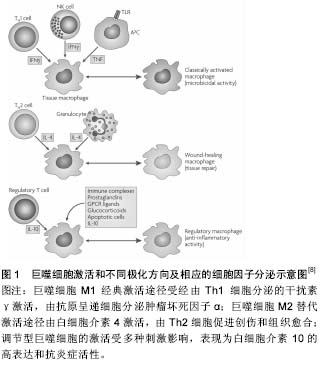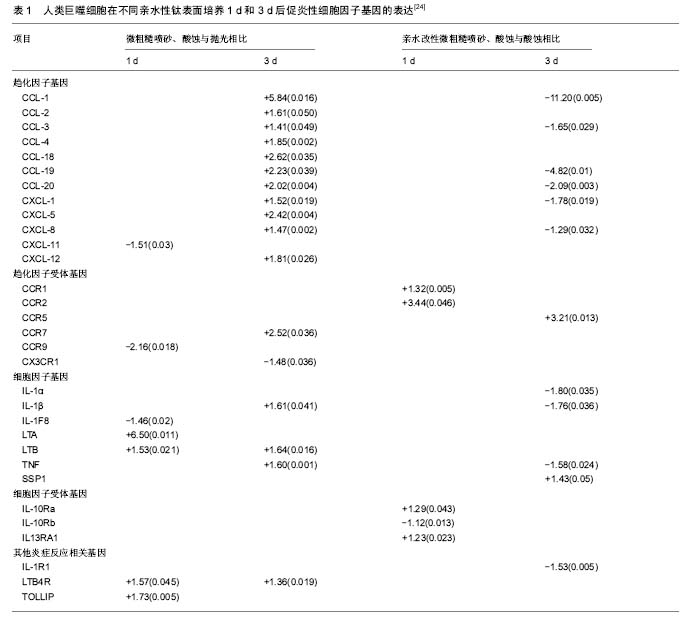| [1]Xing H,Wang X,Xiao S,et al.Osseointegration of layer-by-layer polyelectrolyte multilayers loaded with IGF1 and coated on titanium implant under osteoporotic condition.Int J Nanomedicine. 2017;12:7709-7720.[2]Terheyden H,Lang NP,Bierbaum S,et al.Osseointegration - communication of cells.Clin Oral Implants Res.2012;23(10):1127-1135.[3]Sinder BP,Pettit AR,McCauley LK.Macrophages: Their Emerging Roles in Bone.J Bone Miner Res. 2015;30(12):2140-2149.[4]Miron RJ,Bosshardt DD.OsteoMacs: Key players around bone biomaterials. Biomaterials.2016;82:1-19.[5]Davies LC,Jenkins SJ,Allen JE,et al.Tissue-resident macrophages.Nat Immunol.2013;14(10):986-995.[6]Mantovani A,Biswas SK,Galdiero MR,et al.Macrophage plasticity and polarization in tissue repair and remodelling. J Pathol. 2013;229: 176-185.[7]Anton K,Banerjee D,Glod J.Macrophage-associated mesenchymal stem cells assume an activated, migratory, pro-inflammatory phenotype with increased IL-6 and CXCL10 secretion.PloS One. 2012;7: e35036.[8]Mosser DM,Edwards JP.Exploring the full spectrum of macrophage activation.Nat Rev Immunol. 2008;8:958-969. [9]Martinez FO,Gordon S.The M1 and M2 paradigm of macrophage activation: time for reassessment. F1000Prime Rep.2014;6:13. [10]Tugal D,Liao X,Jain MK.Transcriptional control of macrophage polarization. Arterioscler Thromb Vasc Biol.2013;33(6):1135-1144. [11]Chen Z,Mao X,Tan L,et al.Osteoimmunomodulatory properties of magnesium scaffolds coated with β-tricalcium phosphate. Biomaterials. 2014;35(30):8553-8565.[12]Murray PJ,Allen JE,Biswas SK,et al.Macrophage activation and polarization: nomenclature and experimental guidelines.Immunity. 2014;41:14-20. [13]Ziegler T,Rausch S,Steinfelder S,et al.A novel regulatory macrophage induced by a helminth molecule instructs IL-10 in CD4+ T cells and protects against mucosal inflammation.J Immunol. 2015;194(4): 1555-1564.[14]Trindade R,Albrektsson T,Wennerberg A.Current concepts for the biological basis of dental implants: foreign body equilibrium and osseointegration dynamics.Oral Maxillofac Surg Clin North Am. 2015;27(2):175-183. [15]Gibon E,Lu LY,Nathan K,et al.Inflammation, ageing, and bone regeneration.J Orthop Translat. 2017;10:28-35. [16]Cho SW,Soki FN,Koh AJ,et al.Osteal macrophages support physiologic skeletal remodeling and anabolic actions of parathyroid hormone in bone.Proc Natl Acad Sci U S A.2014;111(4):1545-1550.[17]Guihard P,Danger Y,Brounais B,et al.Induction of osteogenesis in mesenchymal stem cells by activated monocytes/macrophages depends on oncostatin M signaling.Stem Cells.2012;30(4):762-772.[18]Karazisis D,Ballo AM,Petronis S,et al.The role of well-defined nanotopography of titanium implants on osseointegration: cellular and molecular events in vivo.Int J Nanomedicine.2016;11:1367-1382. [19]Karazisis D,Petronis S,Agheli H,et al.The influence of controlled surface nanotopography on the early biological events of osseointegration. Acta Biomater.2017;53:559-571.[20]Lü WL,Wang N,Gao P,et al.Effects of anodic titanium dioxide nanotubes of different diameters on macrophage secretion and expression of cytokines and chemokines.Cell Prolif.2015;48(1):95-104.[21]Ma QL, Zhao LZ, Liu RR, et al. Improved implant osseointegration of a nanostructured titanium surface via mediation of macrophage polarization.Biomaterials.2014;35(37):9853-9867. [22]樊牮,邹耿森,陈江.钛种植体表面纳米改性及其与机体免疫应答[J].国际口腔医学杂志, 2014,41(6):691-693.[23]He XT,Li X,Yin Y,et al.The effects of conditioned media generated by polarized macrophages on the cellular behaviours of bone marrow mesenchymal stem cells.J Cell Mol Med.2017.doi: 10.1111/jcmm.13431.[Epub ahead of print][24]Alfarsi MA,Hamlet SM,Ivanovski S.Titanium surface hydrophilicity modulates the human macrophage inflammatorycytokine response.J Biomed Mater Res A.2014;102(1):60-67. [25]Hotchkiss KM,Reddy GB,Hyzy SL,et al.Titanium surface characteristics, including topography and wettability, alter macrophage activation.Acta Biomater.2016;31:425-434. [26]Hotchkiss KM,Ayad NB,Hyzy SL,et al.Dental implant surface chemistry and energy alter macrophage activation in vitro.Clin Oral Implants Res.2017;28(4):414-423.[27]Lee RS,Hamlet SM,Ivanovski S,et al.The influence of titanium surface characteristics on macrophage phenotype polarization during osseous healing in type I diabetic rats: a pilot study.Clin Oral Implants Res. 2017;28(10):e159-e168. [28]Alfarsi MA,Hamlet SM,Ivanovski S.The Effect of Platelet Proteins Released in Response to Titanium Implant Surfaces on Macrophage Pro-Inflammatory Cytokine Gene Expression. Clin Implant Dent Relat Res. 2015;17(6):1036-1047. [29]Rydén L,Omar O,Johansson A,et al.Inflammatory cell response to ultra-thin amorphous and crystalline hydroxyapatite surfaces.J Mater Sci Mater Med.2017;28(1):9.[30]Mestres G,Espanol M,Xia W,et al.Inflammatory response to nano- and microstructured hydroxyapatite. PLoS One.2015;10(3):e0120381. [31]Hamlet S,Ivanovski S.Inflammatory cytokine response to titanium chemical composition and nanoscale calcium phosphate surface modification.Acta Biomater.2011;7(5):234523-234553. [32]Lee CH,Kim YJ,Jang JH,et al.Modulating macrophage polarization with divalent cations in nanostructured titanium implant surfaces. Nanotechnology.2016;27(8):085101. [33]Park JW,Kim YJ,Jang JH,et al.Positive modulation of osteogenesis- and osteoclastogenesis-related gene expression with strontium-containing microstructured Ti implants in rabbit cancellous bone.J Biomed Mater Res A.2013;101(1):298-306.[34]Li K,Shen Q,Xie Y,et al.Incorporation of cerium oxide into hydroxyapatite coating regulates osteogenic activity of mesenchymal stem cell and macrophage polarization.J Biomater Appl. 2017;31(7): 1062-1076.[35]Wessely-Szponder J,Szponder T,Bobowiec R.Different activation of monocyte-derived macrophages by antimicrobial peptides at a titanium tibial implantation in rabbits.Res Vet Sci.2017;115:201-210.[36]Pajarinen J,Kouri VP,Jämsen E,et al.The response of macrophages to titanium particles is determined by macrophage polarization.Acta Biomater.2013;9(11):9229-9240. [37]Nie B,Ao H,Zhou J,et al.Biofunctionalization of titanium with bacitracin immobilization shows potential for anti-bacteria, osteogenesis and reduction of macrophage inflammation.Colloids Surf B Biointerfaces. 2016;145:728-739. [38]Cha BH,Shin SR,Leijten J,et al.Integrin-Mediated Interactions Control Macrophage Polarization in 3D Hydrogels.Adv Healthc Mater. 2017;6(21).doi: 10.1002/adhm.201700289.Epub 2017 Aug 7.[39]Thalji GN,Nares S,Cooper LF.Early molecular assessment of osseointegration in humans. Clin Oral Implants Res.2014;25(11):1273-1285. [40]Nagasawa M,Cooper LF,Ogino Y,et al.Topography Influences Adherent Cell Regulation of Osteoclastogenesis.J Dent Res. 2016; 95(3):319-326. [41]Ma QL,Fang L,Jiang N,et al.Bone mesenchymal stem cell secretion of sRANKL/OPG/M-CSF in response to macrophage-mediated inflammatory response influences osteogenesis on nanostructured Ti surfaces. Biomaterials.2017;154:234-247.[42]Hefti T,Frischherz M,Spencer ND,et al.A comparison of osteoclast resorption pits on bone with titanium and zirconia surfaces. Biomaterials. 2010;31(28):7321-7331.[43]Brinkmann J,Hefti T,Schlottig F,et al.Response of osteoclasts to titanium surfaces with increasing surface roughness: an in vitro study.Biointerphases.2012;7(1-4):34. [44]Milleret V,Tugulu S,Schlottig F,et al.Alkali treatment of microrough titanium surfaces affects macrophage/monocyte adhesion, platelet activation and architecture of blood clot formation. Eur Cell Mater. 2011;21:430-444;discussion 444.[45]Mamalis AA,Markopoulou C,Vrotsos I,et al.Chemical modification of an implant surface increases osteogenesis and simultaneously reduces osteoclastogenesis: an in vitro study.Clin Oral Implants Res. 2011;22(6):619-626. [46]Davison NL,Luo X,Schoenmaker T,et al.Submicron-scale surface architecture of tricalcium phosphate directs osteogenesis in vitro and in vivo.Eur Cell Mater.2014;27:281-297;discussion 296-297.[47]Wang J,Liu D,Guo B,et al.Role of biphasic calcium phosphate ceramic-mediated secretion of signaling molecules by macrophages in migration and osteoblastic differentiation of MSCs.Acta Biomater. 2017;51:447-460. [48]Sunarso,Toita R,Tsuru K,et al.A superhydrophilic titanium implant functionalized by ozone gas modulates bone marrow cell and macrophage responses.J Mater Sci Mater Med.2016;27(8):127.[49]Förster Y,Rentsch C,Schneiders W,et al.Surface modification of implants in long bone.Biomatter. 2012;2(3):149-157.[50]Nayak S,Dey T,Naskar D,et al.The promotion of osseointegration of titanium surfaces by coating with silk protein sericin.Biomaterials. 2013;34(12):2855-2864.[51]Nie B,Ao H,Zhou J,et al.Biofunctionalization of titanium with bacitracin immobilization shows potential for anti-bacteria, osteogenesis and reduction of macrophage inflammation.Colloids Surf B Biointerfaces. 2016;145:728-739. [52]Chen Z,Wu C,Gu W,et al.Osteogenic differentiation of bone marrow MSCs by β-tricalcium phosphate stimulating macrophages via BMP2 signalling pathway.Biomaterials.2014;35(5):1507-1518.[53]Miron R,Bosshardt D.Multi-Nucleated Giant Cells: Good Guys or Bad Guys? Tissue Eng Part B Rev. 2017.doi:10.1089/ten.TEB.2017.0242.[Epub ahead of print] [54]Thalji G,Cooper LF.Molecular assessment of osseointegration in vitro: a review of current literature.Int J Oral Maxillofac Implants. 2014; 29(2):e171-199. [55]Wythe SE,Nicolaidou V,Horwood NJ.Cells of the immune system orchestrate changes in bone cell function.Calcif Tissue Int. 2014; 94(1):98-111. [56]Takayanagi H.New developments in osteoimmunology.Nat Rev Rheumatol.2012;8(11):684-689.[57]Trindade R,Albrektsson T,Tengvall P,et al.Foreign Body Reaction to Biomaterials: On Mechanisms for Buildup and Breakdown of Osseointegration.Clin Implant Dent Relat Res.2016;18(1):192-203. |
.jpg)


.jpg)